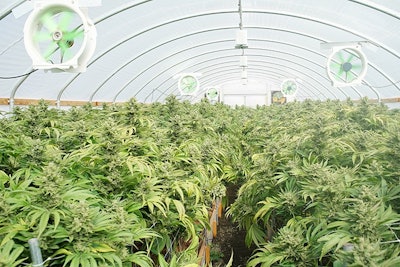
This week, a jury in Denver decided that a southern Colorado marijuana grow facility did not hurt the property values of a neighboring couple, ending a closely watched lawsuit that could have disrupted the nation’s legal cannabis industry. Elsewhere, Coca-Cola’s CEO said the company does not have plans to enter the CBD market, despite earlier claims that the beverage giant would do so.
Here, we’ve rounded up the 10 headlines you need to know before this week is over.
- Federal: Coca-Cola last month teased the possibility it could get into the cannabis business. But the beverage maker now says it's not interested in marijuana. CEO James Quincey said the company "doesn't have any plans at this stage" to enter the CBD market, during an earnings conference call with analysts Tuesday. Read more
- Michigan: Michigan State University researchers will further their study into the effects of marijuana after receiving more than $2 million from the National Institutes of Health. As researchers all around the country are working to study the effects that marijuana has on our bodies, Norbert Kaminski, a professor of pharmacology and toxicology at MSU, is working to figure out if marijuana can act as an anti-inflammatory and help slow down the mental decline that many HIV patients experience. Read more
- A Michigan judge has once again halted the state’s self-imposed deadline to issue licenses to medical marijuana businesses. The Oct. 31 deadline, now lifted, was expected to force more than 200 dispensaries to close across the state. Read more
- Maryland: The Maryland Medical Cannabis Commission issued an “administrative hold” on all products using marijuana grown by ForwardGro, which operates a large greenhouse in Lothian, in Anne Arundel County. The hold, communicated to the state’s 69 dispensaries on Oct. 7, was described as a “precautionary measure.” Read more
- Oklahoma: For the first time, medical marijuana dispensaries across the state are allowed to sell products to patients with a medical marijuana patient license. As of last Sunday, the Oklahoma Medical Marijuana authority through the Oklahoma State Department of Health have approved 608 dispensary licenses and 8,459 patient licenses. Read more
- Nevada: According to a new report by RCG Economics LLC and The Nevada Dispensary Association, which represents 90 percent of dispensaries statewide, taxable cannabis sales surpassed $525 million in the period from July 2017 to July 2018. The sales generated total economic benefits of almost $1 billion. Read more
- New York: A bill introduced last week by Assemblyman Richard Gottfried and cosponsored by 17 of his Democratic colleagues could lower out-of-pocket costs for patients by requiring public health plans in the state, including Medicaid, to cover the drug. This would greatly expand access, as most insurers currently refuse to cover cannabis because of its federal status as a Schedule I drug. Read more
- Florida: The Florida House is seeking to intervene in a potentially far-reaching legal battle about the constitutionality of a 2017 law that set regulations for the state’s medical-marijuana industry. In a motion filed last week seeking to intervene in the case, House lawyers contended that the 2017 law was carefully crafted to carry out the voter-approved constitutional amendment and to comply with federal guidance about medical marijuana issues. Read more
- Colorado: A southern Colorado marijuana grow facility did not hurt the property values of a neighboring couple, a jury in Denver decided Wednesday, ending a closely watched lawsuit that had hung like a dark cloud over the state’s cannabis industry. If the lawsuit had been successful, it could have created a blueprint for opponents of marijuana legalization to dismantle the industry through civil cases brought under federal anti-racketeering laws. Read more
- Canada: The Canadian cannabis industry is still reeling from sky-high demand in the second week of legalization, with growers expressing frustration at the length of time it's taking to get licensed as shelves sit empty. After receiving a cultivation license, a grower must produce two full crops, send them off for testing, get its sales software audited, and then submit a completed application for the sales license, which can take up to 341 days to process. Read more
Top Image: © CascadeCreatives | Adobe Stock

























